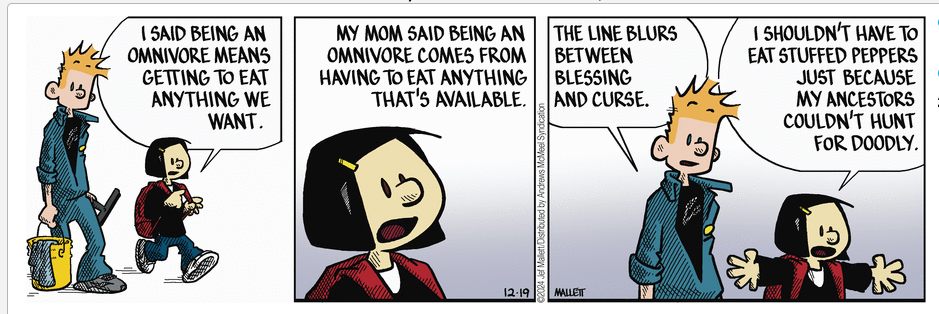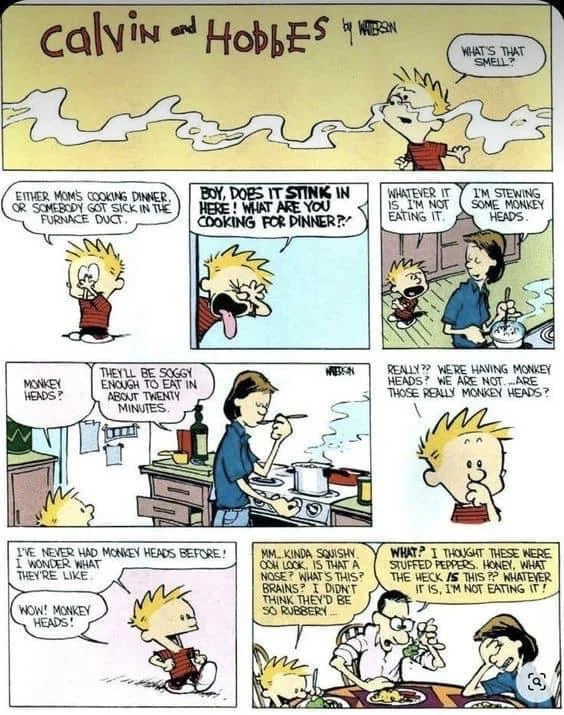Evolutionary semantics
« previous post | next post »
I should note that most traditional stuffed pepper recipes involve ground beef, along with things like cheese and rice and onions and tomato sauce all mixed in the peppers, so they're definitely a dish for omnivores (though vegetarian versions are possible).
Anyhow, Calvin & Hobbes have a different take on the same problem, in which different people seem to have different ideas about how the fruits of hunting and gathering should be ranked, in whatever combinations:
And of course there are figurative uses, as exemplified in the précis of Helen DeWitt's The Last Samurai as one of the New York Times' "The 100 Best Books of the 21st Century" (quoted in Merriam-Webster's online entry for "omnivore"):
Sibylla, an American expat in Britain, is a brilliant scholar: omnivore, polyglot, interdisciplinary theorist — all of it. Her young son, Ludo, is a hothouse prodigy, mastering the “Odyssey” and Japanese grammar, fixated on the films of Akira Kurosawa. Two questions arise: 1) Who is the real genius? 2) Who is Ludo’s father? Ludo’s search for the answer to No. 2 propels the plot of this funny, cruel, compassionate, typographically bananas novel. I won’t spoil anything, except to say that the answer to No. 1 is Helen DeWitt.


Philip Taylor said,
December 21, 2024 @ 11:08 am
The finest stuffed pepper dish that I have ever encountered is the Morrich namuna served at the Moonlight Tandoori, Lostwithiel, Cornwall, U.K. A whole green pepper stuffed with lightly glazed diced chicken tikka — served and priced as a starter, it is sufficiently filling to serve as a main course for those (like myself) with relatively modest appetites. To the best of my knowledge this dish is not served (at least under this name) anywhere else, and the owner tells me that the recipe is his own creation.
SlideSF said,
December 21, 2024 @ 3:53 pm
@Philip Taylor
That sounds amazing. As I am unlikely to find myself in Lostwithiel, or any other part of Cornwall in the near future, I am going to have to try and reimagine in my own kitchen. Thanks for the suggestion!
In the meantime, one of my favorite kinds of stuffed pepper is the lowly chile relleno.
Best made at home.
JPL said,
December 21, 2024 @ 4:03 pm
As for monkey heads, according to the personal post-meal testimony of someone who I had just seen scoop out the brains and lustily consume with extreme relish the brains of a stewed monkey head, monkey brains are an exquisite delicacy. (I didn't get the recipe, sorry, but the scent from the bowl was not unpleasant.)
As for the Frazz, it could be a good time to think about the semantic distinction between the quasi- (i.e., periphrastic) modal expressions "getting to" and "having to". What is it exactly, and how did it (the distinction) evolve, and how did the morphosyntactic expression of it evolve? English has a relatively highly developed and strongly structured system of modal expressions, but 'get to' seems to be a bit outside of these developments, as seen in the differences in the causal explanations of omnivorousness in the comic.
Philip Taylor said,
December 21, 2024 @ 4:33 pm
I used to eat sheep's brain salad in a middle-Eastern restaurant not too far from Houndsditch, where I working at the time, but I would draw the line at monkey brain — too close to cannibalism for my liking, and in some cultures accompanied by unbelievable cruelty, the details of which I will omit.
John Swindle said,
December 21, 2024 @ 10:35 pm
My recollection—I could be mistaken—is that Derek Bickerton, in advancing his theory that humans developed language because they were scavengers, talked about our early ancestors in some circumstanses resorting to omnivory. I remember finding that an odd way to put it.
Mark Liberman said,
December 22, 2024 @ 9:27 am
@John Swindle: " Derek Bickerton, in advancing his theory that humans developed language because they were scavengers, talked about our early ancestors in some circumstanses resorting to omnivory.":
See "A new idea about the evolution of language" (6/11/2005:
Language emerged because of the need to recruit and coordinate crews to help in scavenging the carcasses of naturally-deceased megafauna.
But there's nothing in Bickerton's discussion that introduces (any morphological derivative of) the word "omnivore" — it's all about how our ancestors lived off the ancient equivalent of (large animal) roadkill…
John Swindle said,
December 25, 2024 @ 12:04 am
@Mark: Thanks. Clearly I misremembered. Not a first.